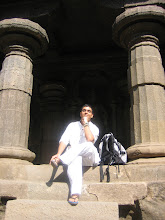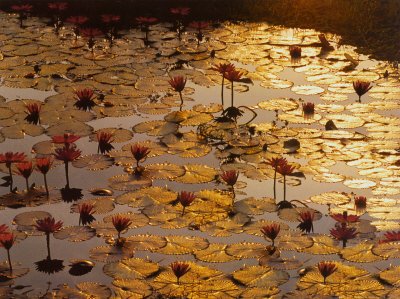Before continuing, I should make myself quite clear: I do not at all believe the Buddha's teachings are an all-or-nothing affair. The diverse life experiences that we have necessarily informs the way we approach our practice. How could it not? The forms of Buddhism are so varied precisely because of this fact. Chinese Buddhism is well, very Chinese. Tibetan Buddhism is Tibetan, Sri Lankan Buddhism, Sri Lankan, etc. Part of the reason the Dharma was able to spread far and wide had to do with the inherent flexibility that the teachings contain.
In the reverse direction, I think that there are many interesting insights that Buddhist teachings contain which can illuminate other traditions. Jewish Buddhists (JuBus) and Zen Christians are perhaps the most prominent examples of this kind of interaction.
The issue(s) I'm interested in don't deal with what I just mentioned but rather with how many people seem to be "stuck" in the Pop-Dharma realm. There are many out there who consciously choose to remain in (or walk away from) this spiritual dilemma but there also many others who may want/need to really "take the plunge" but are held back by something(s).
As I mentioned previously, Pop-Dharma can be useful because it allows exploration of the teachings in a casual environment but really delving into the teachings and practices requires one very important thing: commitment. The numerous jokes in pop culture (often at the expense of men) attest to the fear of "being held down" or "stripped of freedom" and while I'm sure there are many who are uncomfortable with commitment (of one form or another) I think there are other, more influential factors which keep people from committing.
There may be Third and even Fourth Generation Dharma teachers in the West but Buddhism is still not yet, by any stretch, part of the mainstream. Even though many teachers/Sanghas have made strides in adapting the teachings to a Western context, Buddhism in the West still retains a very Asian feel. The majority of Buddhists in the US for example, come from Asian backgrounds and the monastics who live and teach at these "ethnic temples" are often from the country in which that tradition belongs. When many "book Buddhists" or Pop-Dharma folks walk into a temple and see things like bowing, offerings of candles/incense, and an attitude of deference towards the monastics, alarm bells are likely to go off.
A sizable chunk of the people who wind up exploring the Buddha's teachings (myself included) are lost and wounded refugees fleeing negative experiences with Western monotheism. The experiences many of us have had automatically make us suspicious of that which resembles the things we have turned away from. For many, rituals and devotional practices are more reflective of the cultural baggage that Buddhism has accrued over the centuries and there is a popular notion that it needs to be stripped away in order to free of it its "cultural trappings". I will argue however, that the real "cultural baggage" many people need to deal with isn't so much Asian as it is Western.
It's true that Buddhism has picked up many cultural influences and the way people think about and practice Buddhism in many places is more reflective of local customs/culture than what the Sage of the Shakyas originally taught in ancient India. Now that the Dharma has arrived in the West, it will certainly have to adapt yet again but the knee-jerk iconoclasm that plagues much of Buddhism in the West is part of what Berchloz is speaking of when he talks about Western practitioners who think they're smarter than a 2500 year old tradition.
One of my favorite stories regarding iconoclasm involves the famous Ch'an master Huang Po. This particular story deals with Huang Po (a typical Zen iconoclast himself) and the young man who was then the emperor of China:
A demonstration of Huang Po’s fearlessness is given in one of P’ei Hsiu’s anecdotes. His master was attending an assembly at the Bureau of the Imperial Salt Commissioners in the presence of the Emperor. The Son of Heaven noticed Huang Po make three bows before a statue of the Buddha and asked him what he expected to gain from this. The Emperor must have been aware of his [Huang-Po's] general teaching that all rituals are a waste of time since all is the Buddha-mind. Huang Po replied that it was his custom to show respect in this way. But the Imperial grandee insisted on a doctrinal answer.The Buddha taught that mindlessly clinging to rites and rituals (Pali: sīlabbataparāmāsa) is one of the Ten Fetters (samyojana) which keeps us trapped in the cycle of suffering. For those with a deeply rooted suspicion of "organized religion", this teaching is exactly what the doctor ordered. There is, however, a very interesting follow up to this concept. In addition to teaching about the danger of clinging to rites and rituals, the Buddha also taught that nagging skeptical doubt (vicikicchā) with regard to the Dharma is one of the Five Hindrances (pañca nīvaraṇāni) that impede our ability to practice and free ourselves from suffering.
"What purpose does it serve?" he persisted, whereupon Huang Po slapped him. "You are uncouth!",� cried the Emperor.
"What?!" rejoined the master, "You are making a distinction between uncouth and refined?",� and another slap landed on the Imperial visage. It is reported that the Emperor withdrew in the face of this onslaught and Huang Po went on his way unmolested, a remarkable fact, indeed for the times.
There is certainly no shortage of quacks, charlatans, pseudo-gurus, and holy-roller scam artists out running around and we would do well to always use our critical faculties to protect ourselves from spiritual exploitation. The Buddha himself recommended this practice with the well known phrase "ehi passiko" - come and see. Similarly, in the well known Kalama Sutta, he advises a group of spiritual seekers to only accept teachings (including his own!) after a rigorous examination. But what happens after the "trial period" when we've put the teachings into practice and had a taste of their benefits?
Skeptical doubt was just mentioned as one of the Hindrances to spiritual practice. The traditional antidote to skeptical doubt is
Nourishing and growing all good ways,
Cutting away the net of doubt, freeing from the torrent of passion,
Revealing the unsurpassed road of the ultimate peace.
The Great Master Nagarjuna, in his work, Precious Garland, says:
Due to having faith one relies on the practices,
Due to having wisdom one truly knows.
Of these two wisdom is the chief.
Faith is the prerequisite.
The Buddhadharma is often called the Middle Way because it avoids the extremes which lead us to suffering. On one had, we must avoid letting ourselves become close minded and intolerant. We must also (perhaps more relevantly) not allow our cynical, aversively skeptical tendencies shoot ourselves in the spiritual foot.
The Sutra of the Perfection of Wisdom's Diamond That Cuts Through Illusion, aka the Diamond Sutra has a useful passage to remember regarding faith and the willingness to delve into the Buddhadharma. Here (Chapter 6), the Buddha and his disciple Subhuti are discussing whether or not people in the future will have any faith in the Buddha's teachings. After affirming that there will indeed be people who not only have faith but also practice and become liberated, the Buddha talks to Subhuti about the nature of attaching to ideas and concepts. After telling Subhuti that bodhisattvas don't attach to perceptions or no-perceptions, the Buddha says:
And why not? Because, Subhuti, if these fearless bodhisattvas created the perception of a dharma, they would be attached to a self, a being, a life, and a soul. Likewise, if they created the perception of no dharma, they would be attached to a self, a being, a life, and a soul.
And why not? Because surely, Subhuti, fearless bodhisattvas do not cling to a dharma, much less no dharma. This is the meaning behind the Tathagatha's saying, "A dharma teaching is like a raft. If you should let go of dharmas, how much more so no-dharmas'?








No comments:
Post a Comment